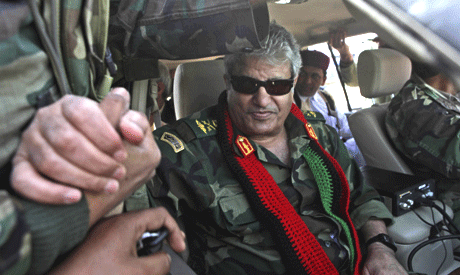
Libyan rebel military leader Abdel-Fattah Younis is greeted by Libyan rebels at the front line near Brega, Libya, April 1, (AP).
Libyan rebels say the gunmen who shot dead their military chief were militiamen allied in their struggle to overthrow Muammar Gaddafi, raising questions about divisions and lawlessness within rebel ranks.
The assassination of Abdel Fattah Younes has hurt the opposition just as it was winning broader international recognition and launching an offensive against Gaddafi's forces in the Western Mountains area.
After 24 hours of confusion, rebel minister Ali Tarhouni said Younes had been killed by fighters who were sent to fetch him from the front, and that his bullet-riddled and partially burnt body was found at a ranch near the rebel capital of Benghazi.
Tarhouni said late Friday a militiaman had been arrested and confessed that his subordinates had carried out the killing.
Younes had been part of Gaddafi's inner circle since the 1969 coup that brought the Libyan colonel to power. He was interior minister before defecting to the rebels in February.
Many rebels had been uncomfortable working under a man who had been so close to Gaddafi for 41 years, and rebel sources said on Thursday Younes had been recalled over suspicions he or his family were secretly in contact with the Libyan leader.
Rebels were divided over who had killed Younes, some suspecting his execution was ordered by rebel leaders for treason, many believing he was killed by Gaddafi supporters who had infiltrated rebel ranks, and still others suggesting a rebel splinter group had acted alone.
Gaddafi's government pointed the finger at Fawzi Bu Kitf, head of the Union of Revolutionary Forces, a federation of armed rebel groups operating in the east of the country.
In an apparent effort to distance himself from the killing, Bu Kitf on Saturday named the key suspect as Mustafa Al-Rubh, the field commander who had been dispatched to arrest Younes.
"He is a member of the Union as an individual," Bu Kitf told reporters. "Whatever was done was done through his own idea."
Whatever the truth, the killing deepens concerns among the rebels' Western backers, keen to see them prevail in a five-month-old civil war but frustrated by their lack of unity and nervous about the influence of Islamists.
The United States, which like some 30 other nations has formally recognised the opposition, called for solidarity.
"What's important is that they work both diligently and transparently to ensure the unity of the Libyan opposition," State Department spokesman Mark Toner said in Washington.
Rebels who rose up against Gaddafi in February have seized swathes of the country but remain poorly equipped and are still far from ousting him, despite support from NATO airstrikes.
Rebels said Saturday they had encircled Gaddafi's last stronghold in the Western Mountains and hoped to seize it soon.
Rebel tanks fired at Tiji, where some 500 government troops are stationed.
"We have Tiji surrounded and we hope to take it by the end of the day," rebel commander Nasir Al-Hamdi, a former police colonel, told Reuters as gunfire crackled in the distance.
Rebels also made a new push on the front just west of the rebel-held city of Misrata. Hospital sources said 12 rebels were killed and 60 wounded in fighting that rebels said took them to the edge of Zlitan, the largest city between Misrata and the capital Tripoli to the west.
"Most of the casualties today were from GRAD missiles and mortar fire. We have advanced well and God willing we will be in Zlitan soon," said Ibrhaim Buwathi, 24.
NATO strikes also continued in western Libya overnight. NATO said early Saturday it had bombed three satellite dishes in Tripoli to stop "terror broadcasts" by Gaddafi, but Libyan state TV remained on air and condemned what it said was the targeting of journalists.
As Libya's civil war grinds on into Ramadan with no end in sight, Libyans on both sides of the conflict say shortages, high prices, rising summer temperatures and worry about loved ones fighting on distant fronts could mar the Muslim fasting month.
"Ramadan will be very tough for us. We're already struggling now. The weather will be very hot and we won't have the energy to fight while we are fasting," said Abdelbadr Adel, 19, a rebel fighting in the Western Mountains.
In the east, confusion reigns over who killed Younes.
Rebel fighters said members of the February 17 Martyrs' Brigade, a rebel group that is part of the Union of Revolutionary Forces, had collected Younes from the frontline near Brega on Thursday.
However, Tarhouni, the rebel minister, said it was another militia, the Obaida Ibn Jarrah Brigade, who had killed Younes.
Locals said the Obaida Ibn Jarrah Brigade mainly comprises former prisoners of Gaddafi's notorious Abu Salim prison in the capital Tripoli, who had always distrusted Younes. Obaid Ibn Jarrah Brigade is not a member of the Union.
Named after one of the companions of Islam's Prophet Mohammad, the group is likely to have Islamist leanings.
One rebel commander, who asked not to be named, said Islamists whom Younes had targeted as interior minister may have killed him in retaliation.
"Some of those Islamists are now fighting with the rebels and they have always refused to fight under Younes's command and have always viewed him with suspicion," he said.
"I don't think the investigation will lead anywhere. They don't dare to touch the Islamists."
Further complicating an already murky situation, some Libyans said they feared that Younes' death would trigger a bloody tribal feud. But in an apparent effort to calm nerves, a rebel source said Younes could be replaced by Suleiman Mahmoud Al-Obeidi, a member of the same tribe.
Short link: